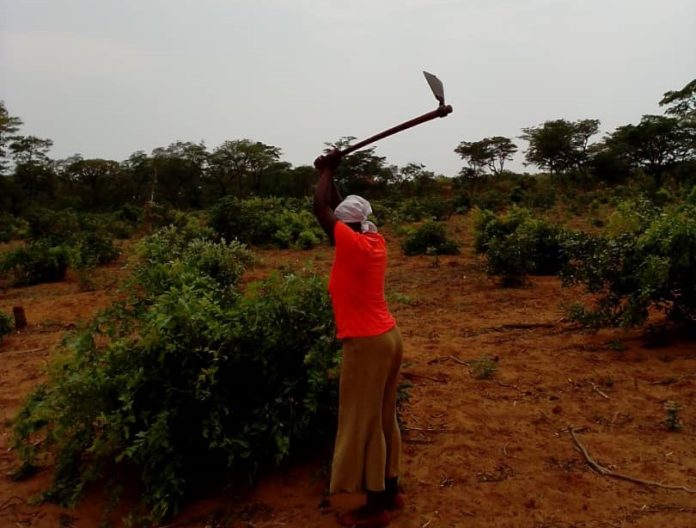Africa’s smallholder farmers are being battered by a “perfect storm” of climate shocks—simultaneous extreme heat, prolonged droughts, floods, and rising temperature variability.
According to Dr. John Choptiany, the Climate Adaptation Expert and lead of the Resilience and Climate Adaptation Program at the International Institute of Tropical Agriculture (IITA), these farmers are ill-equipped to cope and risk collapse if urgent action is not taken.
“Even with adaptation measures, global staple crop yields are projected to decline by about 24% by 2100,” Dr. Choptiany wrote on his LinkedIn account. “Farmers are fighting a multi-front battle they are unprepared to win without significant support and investment in resilience.”
The Frontline of the Climate Crisis
Smallholder farmers, especially those in rain-fed systems, have no reserves to cushion against crop failure. If rains arrive late or pests invade, there is no fallback. Increasingly, too much rain is the problem, flooding homes and fields. Without timely assistance, many are forced to migrate, becoming climate-shock refugees in their own countries.
In sub-Saharan Africa, where 95% of farmers rely on rain-fed agriculture, the stakes are high. Shorter, unpredictable rainy seasons and more frequent droughts are taking a toll. In 2021, the Horn of Africa faced its worst drought in over 40 years after three consecutive failed rainy seasons, leaving millions hungry. Without significant mitigation, such droughts are likely to continue.
Higher temperatures will worsen the crisis. At 4°C of global warming, maize yields in some African countries could drop by more than 20%, a major blow as maize provides nearly half the calories and protein consumed in Southern and Eastern Africa. Even at 2°C warming, yields of maize, sorghum, millet, and wheat in sub-Saharan Africa could decline by 5–10%, with far greater losses in vulnerable regions.
Beyond Yields – Nutrition and Livelihoods at Risk
Climate change does not only reduce yields—it also diminishes nutritional quality. Elevated CO₂ levels are linked to lower protein, iron, zinc, and Vitamin B in staple crops like rice. Economically, the losses are staggering: Tanzania, for example, has seen a 20% drop in export revenues over 40 years due to just a 1°C temperature rise. Africa requires $50 billion annually to adapt effectively.
For generations, African farmers have used inherited knowledge to guide planting and predict rainfall. Now, erratic weather and new pests like the fall armyworm are eroding these methods. “Climate change is dismantling the foundation of local farming wisdom,” Dr. Choptiany says, adding that limited investment in science is further weakening farmers’ ability to adapt.
A Widening Yield Gap
While global crop yields rise with technology and investment, Africa’s yields remain low. Average maize yields are just 1.2–2.8 t/ha, far below the global average of 6.5 t/ha and potential yields of over 10 t/ha. Climate change is making this gap wider, threatening greater dependence on costly imports.
Within the smallholder community, women, the elderly, and people with disabilities are most vulnerable. Pregnant women and children face serious health threats from extreme heat. Access to agricultural extension services is extremely limited, with one agent often serving 1,000 farmers, meaning best practices and climate-smart solutions rarely reach those who need them.
Acting Before the Window Closes
Dr. Choptiany says there is no single solution—only a coordinated approach combining:
- Innovation in crop breeding for drought-, heat-, and pest-resistant varieties.
- Sustainable practices like integrated soil fertility management and crop diversification.
- Digital advisory tools for weather alerts and site-specific recommendations.
- Capacity building through farmer field schools and demonstration plots.
- Policy and research partnerships to guide climate adaptation investments.
- Nutritional resilience by promoting diverse, climate-resilient and underutilised crops.
He adds that co-creating solutions with farmers, recognizing their knowledge, and providing insurance and microfinance will strengthen resilience. “Diversity builds resilience,” Dr. Choptiany notes, stressing that agrobiodiversity helps spread risk and withstand shocks.
The Cost of Inaction
If current trends persist, the result will be deepening food insecurity, rising poverty, and increased displacement—feeding global instability. Some models project malnutrition rates exceeding 40% in Africa by 2030. Yet, adaptation investments can yield returns up to tenfold, with $6 trillion in benefits at stake by 2035.
“The world must not leave Africa’s smallholder farmers behind,” Dr. Choptiany says. “Their resilience underpins the continent’s food security. Their future is our shared responsibility.”








